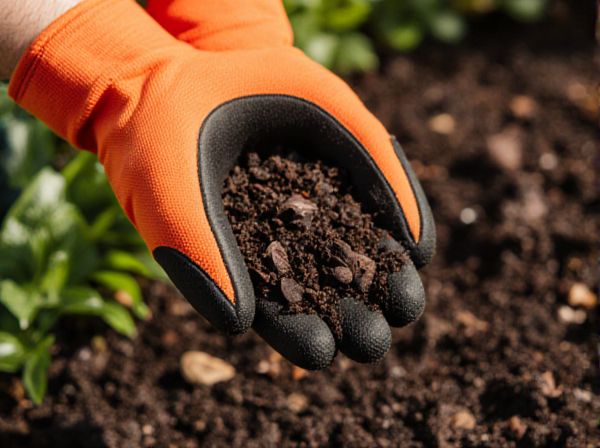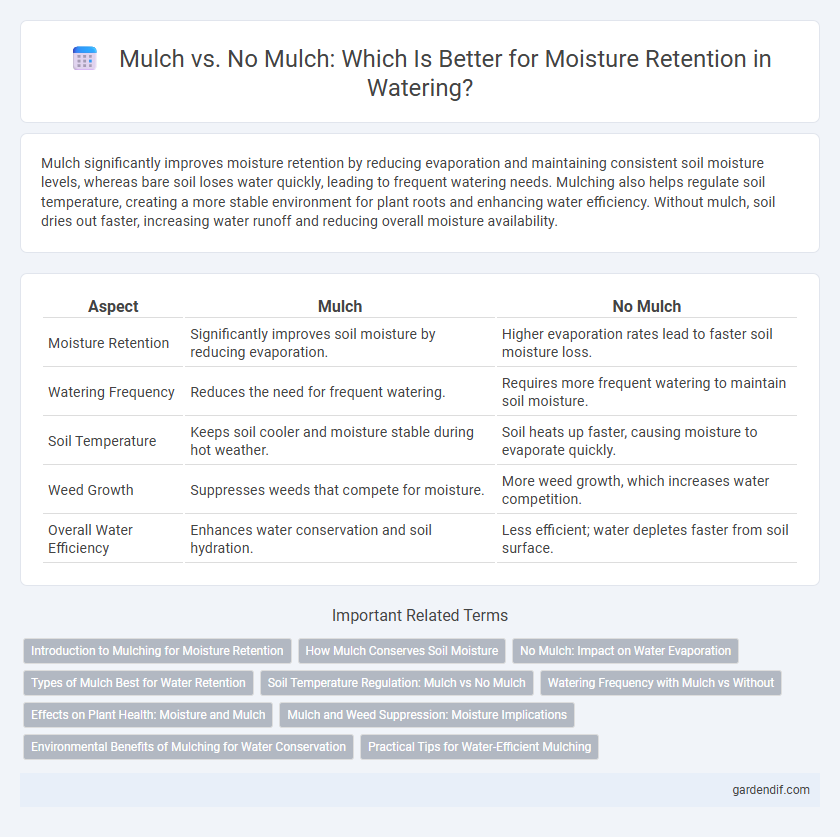
Mulch vs No mulch for moisture retention Illustration
Mulch significantly improves moisture retention by reducing evaporation and maintaining consistent soil moisture levels, whereas bare soil loses water quickly, leading to frequent watering needs. Mulching also helps regulate soil temperature, creating a more stable environment for plant roots and enhancing water efficiency. Without mulch, soil dries out faster, increasing water runoff and reducing overall moisture availability.
Table of Comparison
| Aspect | Mulch | No Mulch |
|---|---|---|
| Moisture Retention | Significantly improves soil moisture by reducing evaporation. | Higher evaporation rates lead to faster soil moisture loss. |
| Watering Frequency | Reduces the need for frequent watering. | Requires more frequent watering to maintain soil moisture. |
| Soil Temperature | Keeps soil cooler and moisture stable during hot weather. | Soil heats up faster, causing moisture to evaporate quickly. |
| Weed Growth | Suppresses weeds that compete for moisture. | More weed growth, which increases water competition. |
| Overall Water Efficiency | Enhances water conservation and soil hydration. | Less efficient; water depletes faster from soil surface. |
Introduction to Mulching for Moisture Retention
Mulching effectively conserves soil moisture by creating a protective barrier that reduces evaporation and moderates soil temperature. Organic mulches, such as wood chips and straw, enhance water retention while improving soil structure and nutrient content. In contrast, bare soil loses moisture rapidly, increasing irrigation frequency and stressing plants.
How Mulch Conserves Soil Moisture
Mulch acts as a protective layer over soil, significantly reducing evaporation by shielding the surface from direct sunlight and wind exposure. It enhances soil moisture retention by maintaining a consistent temperature and minimizing water runoff during irrigation or rainfall. Studies show mulched soils can retain up to 30-50% more moisture compared to bare soils, promoting healthier plant growth and reducing the frequency of watering needs.
No Mulch: Impact on Water Evaporation
No mulch significantly increases water evaporation from soil surfaces, leading to faster moisture loss and reduced soil hydration. This rapid evaporation can stress plants by limiting available water, especially during hot and dry conditions. Maintaining soil moisture without mulch often requires more frequent watering to compensate for these losses.
Types of Mulch Best for Water Retention
Organic mulches such as wood chips, bark, and straw excel at moisture retention by reducing evaporation and enhancing soil structure. Inorganic mulches like gravel and rubber do not improve soil moisture but can help limit evaporation on the soil surface. The best types of mulch for water retention are organic materials that also decompose, releasing nutrients and improving overall soil health.
Soil Temperature Regulation: Mulch vs No Mulch
Mulch significantly improves soil temperature regulation by insulating the soil, keeping it cooler in hot weather and warmer during cold periods. Without mulch, soil temperatures can fluctuate drastically, which stresses plant roots and reduces moisture retention. This temperature stability under mulch enhances soil moisture conservation by minimizing evaporation rates and promoting healthier plant growth.
Watering Frequency with Mulch vs Without
Mulching significantly reduces watering frequency by retaining soil moisture, leading to a decrease in evaporation and improved water conservation. Studies show that mulched areas require up to 50% less frequent irrigation compared to bare soil due to enhanced moisture retention. Without mulch, soil dries faster, necessitating more frequent watering to maintain adequate moisture levels for healthy plant growth.
Effects on Plant Health: Moisture and Mulch
Mulch significantly improves moisture retention by reducing evaporation rates, maintaining consistent soil hydration essential for plant roots. Without mulch, soil dries out faster, causing stress to plants and hindering nutrient uptake. Proper mulch application creates a microclimate that enhances overall plant health by preserving soil moisture and temperature stability.
Mulch and Weed Suppression: Moisture Implications
Mulch significantly enhances moisture retention by reducing evaporation from the soil surface, making it an efficient water-saving technique in gardening and agriculture. By suppressing weed growth, mulch minimizes competition for water resources, allowing plants to access more moisture during dry periods. Studies show that mulched soils maintain higher moisture levels and support healthier plant development compared to bare, unmulched soils.
Environmental Benefits of Mulching for Water Conservation
Mulching significantly improves moisture retention by reducing soil evaporation, which conserves water and decreases irrigation needs by up to 50%. Organic mulch also enhances soil structure and promotes microbial activity, leading to better water infiltration and reduced runoff. These environmental benefits make mulching a key practice for sustainable water conservation in gardening and agriculture.
Practical Tips for Water-Efficient Mulching
Applying mulch significantly improves soil moisture retention by reducing evaporation and maintaining consistent soil temperature, which conserves water resources in gardens and landscapes. Organic mulches like wood chips, straw, and composted leaves break down over time, enriching the soil while enhancing water absorption and retention. For best water-efficient mulching, apply a 2-4 inch layer around plants, avoid piling mulch against stems to prevent rot, and replenish mulch annually to sustain its moisture-conserving properties.
Mulch vs No mulch for moisture retention Infographic

 gardendif.com
gardendif.com